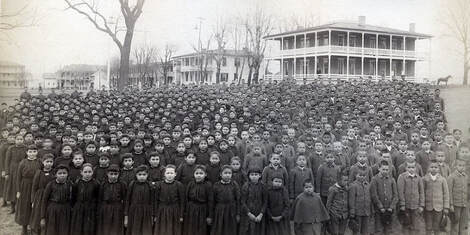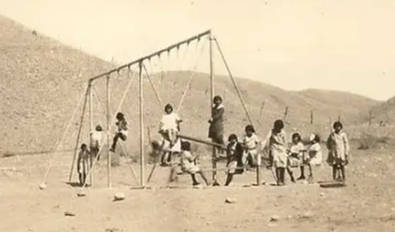Bring Our Children HomeIn June 2021, U.S. Secretary of the Interior Deb Haaland announced that the Department of the Interior would be undertaking an investigation into boarding schools and the federal policies aimed to assimilate Native American children. Captain Richard Henry Pratt's speech in which he used the now well-known phrase to describe his philosophy of genocide through assimilation and education: “Kill the Indian in him, and save the man.”
The Department of the Interior released the first volume of the boarding school investigation on May 11, 2022. It found that “from 1819 to 1969, the federal Indian boarding school system consisted of 408 federal schools across 37 states or then territories, including 21 schools in Alaska and 7 schools in Hawaii. The investigation identified marked or unmarked burial sites at approximately 53 different schools across the school system. As the investigation continues, the Department expects the number of identified burial sites to increase.” Though the report acknowledges a few select stories and harms found during the brief investigation, the report never uses the word “genocide” to describe the directed act to remove children. The Association submitted its written comments to the DOI on December 23, 2021: DOI Boarding School Initiative Written Comments In addition, the Senate and House has recently held hearings on the Truth and Healing Commission on Indian Boarding School Policies Act (H.R. 5444 and S. 2907). This legislation creates a commission to further investigate federal Indian boarding schools and the stories of survivors and their descendants. It further grants subpoena authority to the commission to obtain information about boarding schools. Federal government agencies, as well as churches and other private entities hold valuable information about the children in those schools, and how they were treated. Shockingly, when this U.S. experiment with Indian children was failing – as expressly reported in the Merriam Report[iii] – instead of focusing on local schools that kept children with their families, the U.S. turned over the running of the boarding schools to various Christian churches – who were aided with federal dollars and the labor of those Native children. The Merriam Report stated: “The most fundamental need in Indian education is a change in point of view. Whatever may have been the official governmental attitude, education for the Indian in the past has proceeded largely on the theory that it is necessary to remove the Indian child as far as possible from his home environment; whereas the modem point of view in education and social work lays stress on upbringing in the natural setting of home and family life.” The Association submitted its written comments to the House Natural Resources Committee on May 26, 2022: Truth and Healing Commission on Indian Boarding School Policies Act Written Comments |
Read Our Comments
Genocide was first recognized as a crime under international law in 1946 by the United Nations General Assembly, and defined as: any of the following acts committed with intent to destroy, in whole or in part, a national, ethnical, racial or religious group, as such:
(a) Killing members of the group; (b) Causing serious bodily or mental harm to members of the group; (c) Deliberately inflicting on the group conditions of life calculated to bring about its physical destruction in whole or in part; (d) Imposing measures intended to prevent births within the group; (e) Forcibly transferring children of the group to another group. |
"Beginning with President Washington, the stated policy of the federal government was to replace the Indian’s culture with our own. This was considered 'advisable as the cheapest and safest way of subduing the Indians, of providing a safe habitat for the country’s white inhabitants, of helping the whites acquire desirable land, and of changing the Indian’s economy so that he would be content with less land. Education was a weapon by which these goals were to be accomplished."
Committee on Labor and Public Welfare, Indian Education: A National Tragedy – A National Challenge, S. Rep. No. 91-501 at 143 (1969)
Committee on Labor and Public Welfare, Indian Education: A National Tragedy – A National Challenge, S. Rep. No. 91-501 at 143 (1969)











